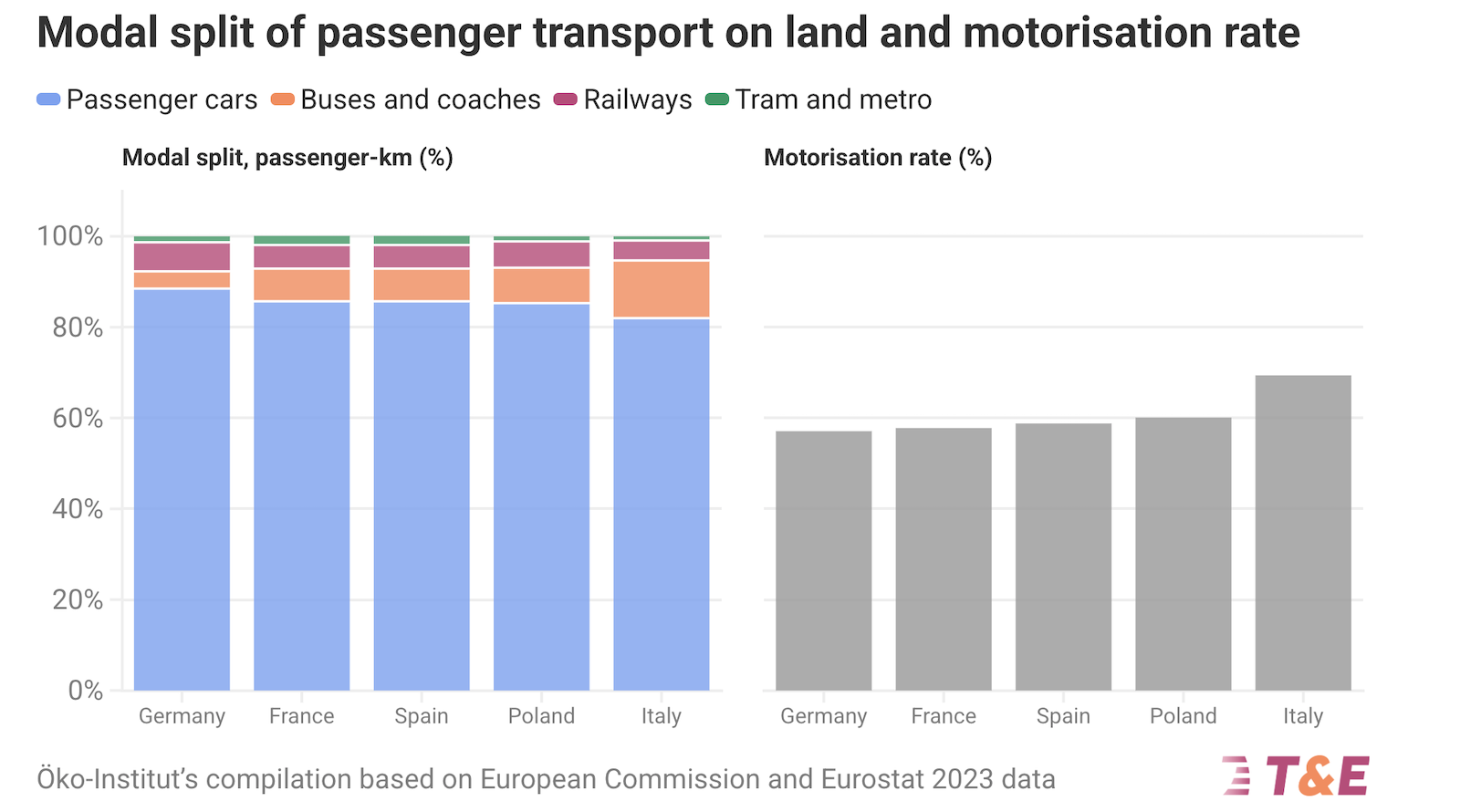
Last Updated on: 27th May 2025, 01:49 am
Exploring how fossil fuel car dependency of low and middle income households in five European countries can lead to transport vulnerability.
Summary
A foundation for policies to support a just transition
As Europe accelerates its transition towards green mobility, rising fuel prices and limited access to electric vehicles (EVs) threaten to leave vulnerable populations and rural communities behind, highlighting the urgent need for political action to ensure an inclusive and fair transition.
This briefing, based on analysis conducted by Öko-Institut for T&E, explores the transport vulnerability arising from fossil fuel car dependency in five European countries: Germany, Spain, France, Italy, and Poland. It focuses on how current mobility patterns and the uneven electrification of the vehicle fleet risk leaving low- and middle-income households behind in the energy transition. The findings provide the foundation for policy recommendations such as social leasing to support a just transition.
The dominance of private cars in mobility patterns: a call for EV democratisation
Cars are the primary mode of transport across the five countries analysed, with car use accounting for more than 80% of total distance traveled—up to 89% in Germany. Car ownership is widespread, especially in Italy and Poland. Public transport usage remains limited, particularly in rural and peri-urban areas. This entrenched car dependency, particularly among low-income households with limited access to alternative transport modes, increases vulnerability to fuel price volatility. While future mobility will be more diversified, cars remain central to daily life —making the democratisation of electric vehicles essential to ensure an equitable transition.
The unequal EV transition: regional disparities and barriers to EV adoption
The adoption of electric vehicles varies widely across Europe. France and Germany lead with 17% and 14% of new car sales in 2024, while Poland, Italy, and Spain lag behind (3%, 4%, and 6%). The transition is slowed by the long lifespan of vehicles but affordability is the major barrier. With average prices around €40,000–45,000, EVs remain out of reach for many. Subsidies mostly benefit wealthier households and companies, while middle-income households rely on a second hand market with limited volumes of electric cars. Corporate fleets, crucial to feeding this market, are also slow to transition.
The fossil fuel car dependency trap: 20 million vulnerable Europeans
Dependence on private combustion-engine vehicles constitutes, combined with rising fuel prices, a vulnerability factor for people with limited incomes living in rural areas. High and unpredictable fuel prices have become a major source of vulnerability, particularly for the share of the adult population that is forced to rely on older, less fuel-efficient vehicles. Considering these factors (dependency, income, and localisation), a vulnerable group can be clearly identified: in Poland, an estimated 13% of the population are considered vulnerable, compared to 9% in France and 5% in Germany and Italy. In France, the lowest income decile spends up to 12.7% of its budget on fuel.
The forthcoming Emissions Trading Scheme for transport and buildings (ETS2) will increase fuel prices further, and potentialy disproportionately affect low-income households. The average additional ETS-2 expenditure as a share of total expenditure varies between 0.3% and 1.0% at a price of EUR 45/tCO2.
Policy recommendations
To avoid a socially regressive transition, targeted national policies are essential. Öko-Institut identifies four key vulnerability factors:
- High car dependence
- Exposure to rising fuel costs
- Affordability challenges for EVs
- Uneven electrification of national car fleets
To address these risks, three policy directions are recommended:
- Inclusive EV support schemes, such as France’s social leasing program, to improve access for low- and middle-income groups.
- Mandatory green targets for corporate fleets to stimulate the second-hand EV market.
- Enhanced investment in public and active transport, particularly in underserved areas, to reduce car dependency.
Only through coordinated action on these fronts can Europe ensure a just and inclusive transition to clean mobility.
Read the rest of this briefing on T&E website.
Sign up for CleanTechnica’s Weekly Substack for Zach and Scott’s in-depth analyses and high level summaries, sign up for our daily newsletter, and/or follow us on Google News!

Whether you have solar power or not, please complete our latest solar power survey.
Have a tip for CleanTechnica? Want to advertise? Want to suggest a guest for our CleanTech Talk podcast? Contact us here.
Sign up for our daily newsletter for 15 new cleantech stories a day. Or sign up for our weekly one on top stories of the week if daily is too frequent.
CleanTechnica uses affiliate links. See our policy here.
CleanTechnica’s Comment Policy


